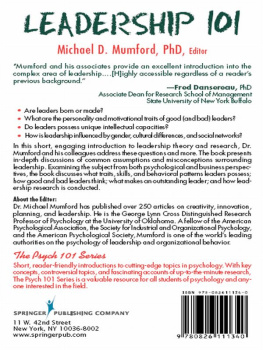Creativity 101
James C. Kaufman, PhD
Genius 101
Dean Keith Simonton, PhD
IQ Testing 101
Alan S. Kaufman, PhD
Leadership 101
Michael D. Mumford, PhD
Psycholinguistics 101
H. Wind Cowles, PhD
Intelligence 101
Jonathan Plucker, PhD
Anxiety 101
Moshe Zeidner, PhD
Gerald Matthews, PhD
The
Psych
Series
James C. Kaufman, PhD, Series Editor
Director, Learning Research Center
California State University
Dr. Michael D. Mumford is the George Lynn Cross Distinguished Research Professor of Psychology at the University of Oklahoma, where he directs the Center for Applied Social Research. He received his doctoral degree from the University of Georgia in 1983 in the fields of industrial and organizational psychology and psychometrics. Dr. Mumford is a fellow of the American Psychological Association (Divisions 3, 5, and 14), the Society for Industrial and Organizational Psychology, and the American Psychological Society. He has written more than 250 articles on creativity, innovation, planning, leadership, and ethics. He serves as senior editor of the Leadership Quarterly and is on the editorial boards of the Creativity Research Journal, the Journal of Creative Behavior, IEEE Transactions on Engineering Management, and the Journal of Business Ethics. Dr. Mumford has served as principal investigator on grants totaling more than $30 million from the National Science Foundation, the National Institutes of Health, the Department of Defense, the Department of Labor, and the Department of State. He is a recipient of the Society for Industrial and Organizational Psychologys M. Scott Myers Award for Applied Research in the Workplace. Dr. Mumfords professional interests lie in the assessment and development of high-level talent. His current research focuses on four specific areas: the identification and measurement of creative thinking skills, successful leadership skills in dynamic organizational settings, the relationship between workplace structure and skill growth and development, and the application of life history as a tool for understanding career development.
Leadership
Edited by
Michael D. Mumford, PhD

Copyright 2010 Springer Publishing Company, LLC
All rights reserved.
No part of this publication may be reproduced, stored in a retrieval system, or transmitted in any form or by any means, electronic, mechanical, photocopying, recording, or otherwise, without the prior permission of Springer Publishing Company, LLC, or authorization through payment of the appropriate fees to the Copyright Clearance Center, Inc., 222 Rosewood Drive, Danvers, MA 01923, 9787508400, fax 9786468600, .
Springer Publishing Company, LLC
11 West 42nd Street
New York, NY 10036
www.springerpub.com
Acquisitions Editor: Philip Laughlin
Project Manager: Mark Frazier
Cover Design: Mimi Flow
Composition: Apex CoVantage, LLC
09 10 11 12/5 4 3 2 1
Library of Congress Cataloging-in-Publication Data
Ebook ISBN: 978-0-8261-1135-7
Leadership 101 / edited by Michael D. Mumford.
p. cm. (The Psych 101 series)
Includes bibliographical references and index.
ISBN 978-0-8261-1134-0 (alk. paper)
1. LeadershipResearch. 2. Leadership. I. Mumford, Michael D.
II. Title: Leadership one oh one. III. Title: Leader one hundred one.
HM1261.L4145 2009
303.34dc22 2009029257
Printed in the United States of America by Hamilton Printing
The author and the publisher of this Work have made every effort to use sources believed to be reliable to provide information that is accurate and compatible with the standards generally accepted at the time of publication. Because medical science is continually advancing, our knowledge base continues to expand. Therefore, as new information becomes available, changes in procedures become necessary. We recommend that the reader always consult current research and specific institutional policies before performing any clinical procedure. The author and publisher shall not be liable for any special, consequential, or exemplary damages resulting, in whole or in part, from the readers use of, or reliance on, the information contained in this book.
The publisher has no responsibility for the persistence or accuracy of URLs for external or third-party Internet Web sites referred to in this publication and does not guarantee that any content on such Web sites is, or will remain, accurate or appropriate.
We would like to dedicate Leadership 101 to the graduate program in industrial and organizational psychology at the University of Oklahoma. We thank you all for your support throughout the production of this book.
Contributors
Alison L. Antes, PhD Candidate,
Department of Industry and Organizational Psychology, the University of Oklahoma, Norman, Oklahoma
Jamie D. Barrett, BA,
Department of Industry and Organizational Psychology, the University of Oklahoma, Norman, Oklahoma
Cheryl K. Beeler, PhD Candidate,
Department of Industry and Organizational Psychology, the University of Oklahoma, Norman, Oklahoma
Cristina L. Byrne, MS,
Department of Industry and Organizational Psychology, the University of Oklahoma, Norman, Oklahoma
Jay J. Caughron, PhD Candidate,
Department of Industry and Organizational Psychology, the University of Oklahoma, Norman, Oklahoma
Tamara L. Friedrich, PhD Candidate,
Department of Industry and Organizational Psychology, the University of Oklahoma, Norman, Oklahoma
Amanda S. Shipman, MS,
Department of Industry and Organizational Psychology, the University of Oklahoma, Norman, Oklahoma
William B. Vessey, BA,
Department of Industry and Organizational Psychology, the University of Oklahoma, Norman, Oklahoma
Preface
Leadership is a topic that has piqued the interest of manyacross a variety of scholarly areas and levels of study. Those interested in political science, business, philosophy, history, and psychology, among others, have each taken unique approaches to understanding this quite important phenomenon. Leadership is a popular topic of study because nearly everyone has been affected by a leader or has been one themselves, and the outcomes of leadership are particularly critical. In this book, we hope to help those with an interest in leadership achieve a level of understanding beyond common assumptions made about leaders and leadership. In this vein, this book is geared toward novice leadership scholars or those who seek a summary of the current status of the field. Example populations that may benefit from this book are individuals in secondary and collegiate education who are not otherwise familiar with scholarly approaches to understanding leadership or individuals that study related topics but need a comprehensive review of leadership.
Because so many seek to understand leadership, we have sought to provide a road map for individuals to continue on to more in-depth study. In doing so, we have addressed what leadership is and the assumptions that are often made about it, so that novice leadership scholars will have an adequate foundation upon which to build their understanding of leadership concepts. We present this information from both a psychological and a business perspective and use research on relevant leadership topics to help readers separate fact from fiction and assumptions from empirical evidence. After reading
Next page












